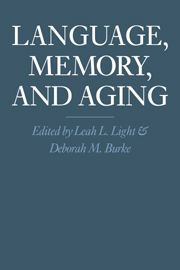Book contents
- Frontmatter
- Contents
- List of contributors
- Preface
- 1 Theories of information processing and theories of aging
- 2 Effects of aging on verbal abilities: Examination of the psychometric literature
- 3 Aging and individual differences in memory for written discourse
- 4 Geriatric psycholinguistics: Syntactic limitations of oral and written language
- 5 Aging and memory activation: The priming of semantic and episodic memories
- 6 Automatic and effortful semantic processes in old age: Experimental and naturalistic approaches
- 7 Integrating information from discourse: Do older adults show deficits?
- 8 Comprehension of pragmatic implications in young and older adults
- 9 Capacity theory and the processing of inferences
- 10 Age differences in memory for texts: Production deficiency or processing limitations?
- 11 Episodic memory and knowledge interactions across adulthood
- 12 The disorder of naming in Alzheimer's disease
- 13 Language and memory processing in senile dementia Alzheimer's type
- 14 Patterns of language and memory in old age
- Author index
- Subject index
9 - Capacity theory and the processing of inferences
Published online by Cambridge University Press: 05 January 2012
- Frontmatter
- Contents
- List of contributors
- Preface
- 1 Theories of information processing and theories of aging
- 2 Effects of aging on verbal abilities: Examination of the psychometric literature
- 3 Aging and individual differences in memory for written discourse
- 4 Geriatric psycholinguistics: Syntactic limitations of oral and written language
- 5 Aging and memory activation: The priming of semantic and episodic memories
- 6 Automatic and effortful semantic processes in old age: Experimental and naturalistic approaches
- 7 Integrating information from discourse: Do older adults show deficits?
- 8 Comprehension of pragmatic implications in young and older adults
- 9 Capacity theory and the processing of inferences
- 10 Age differences in memory for texts: Production deficiency or processing limitations?
- 11 Episodic memory and knowledge interactions across adulthood
- 12 The disorder of naming in Alzheimer's disease
- 13 Language and memory processing in senile dementia Alzheimer's type
- 14 Patterns of language and memory in old age
- Author index
- Subject index
Summary
The study of adult age differences in comprehension of and memory for text is a now burgeoning enterprise in cognitive gerontology, in part because of the potential for direct application of the findings to everyday life. To date, the work on discourse processing suggests the existence of age deficits of varying magnitudes, deficits that are largely quantitative rather than qualitative in nature. The work thus suggests that older adults use the same processing mechanisms as younger adults but with poorer results (e.g., Mandel & Johnson, 1984; Zelinski, Light, & Gilewski, 1984).
Beyond this summary the literature yields few simple generalizations; indeed, the findings on any given variable (e.g., educational level) tend to be complex and inconsistent. Consider the literature on the recall of ideas that differ in their importance to the meaning structure of the text. The usual finding with young adults (called the “levels effect”) is that the probability of recalling information from text is directly related to the information's importance level in the text as defined by a model (e.g., Kintsch's, 1974) of the hierarchical structure of that text. When young and elderly adults have been compared, different experiments have produced contradictory results (for a recent review, see Zelinski et al., 1984; see also Cohen, this volume). The most frequent findings are (1) parallel levels effects for younger and older adults (e.g., Zelinski et al., 1984); or (2) an exaggerated levels effect for the older adults, with the greatest age deficit seen at low importance levels (e.g., Dixon, Hultsch, Simon, & von Eye, 1984, for high verbal ability subjects; Spilich, 1983).
Information
- Type
- Chapter
- Information
- Language, Memory, and Aging , pp. 154 - 170Publisher: Cambridge University PressPrint publication year: 1988
Accessibility standard: Unknown
- 42
- Cited by
